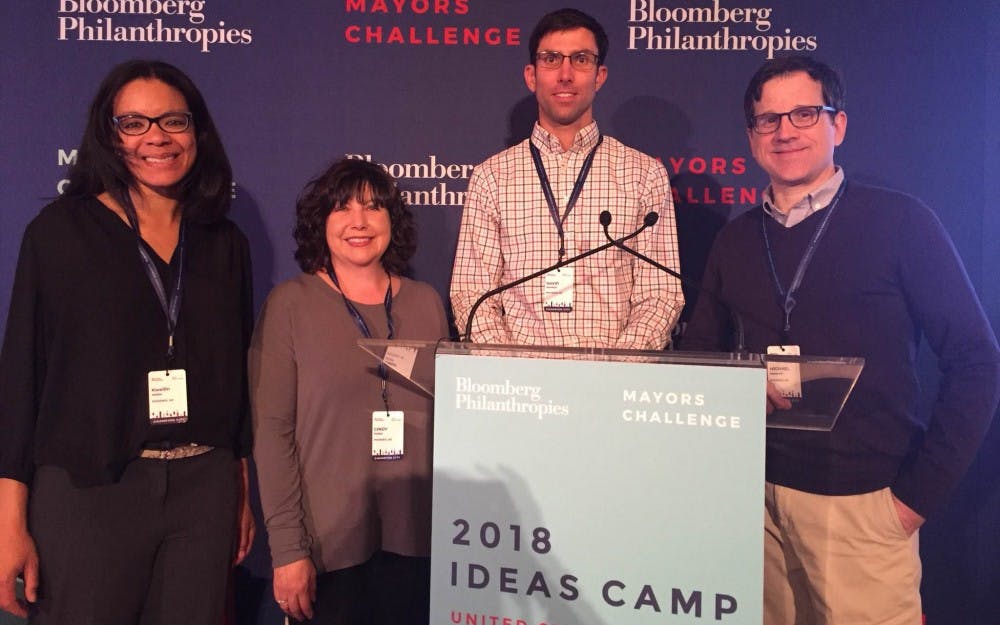With the help of ASU researchers, Phoenix advanced to the next stage in a national innovation competition that could award the city several million dollars to solve heat-related issues, researchers and officials said.
Phoenix was selected to compete in Bloomberg Philanthropies 2018 Mayors Challenge, a nationwide contest between city leaders to come up with solutions to problems their cities face. Phoenix is one of 35 “champion cities” to participate in the challenge, and it was chosen based on a proposal to create a program to combat the intense heat the city faces.
ASU is helping Phoenix create 'HeatReady,' a program "to enable local governments to holistically manage how they identify, prepare for, mitigate, track, and respond to the dangers of urban heat," according to a press release from the Mayor's office.
Phoenix Mayor Greg Stanton said the program addresses climate change, which is a growing threat to Phoenix residents, particularly lower income individuals.
"Make no mistake, climate change is real, and we’ve got to do things to fight climate change," Stanton said. "Nine of the top 10 hottest years (in Phoenix) on record have all occurred ... in the last 15 years."
Bloomberg Philanthropies awarded Phoenix $100,000 to continue developing the program.
In October 2018, Bloomberg Philanthropies will award one city $5 million and four cities each $1 million, according to its website.
"Now that we’ve got the first $100,000, next up is to come up with the concrete proposal and how it will be implemented," Stanton said. "Even if we don’t win the ultimate prize, we’re still going to try to build it into the city budget and the county budget, as well as keep our partnership with ASU."
Stanton said ASU is crucial to many policies that Phoenix works on.
"ASU is in so many ways the ideas factory," Stanton said. "We use them for the expertise of the professors and students (and) we use them for the energy of their student body."
Liza Kurtz, an ASU graduate research assistant at the School of Human Evolution and Social Change, is working on the HeatReady program.
“It’s really about cities putting all of their heat related planning and resources into one structure,” Kurtz said. “Also connecting to other cities who are doing the same kind of work … to create a community of knowledge around heat events.”
David Hondula, an assistant professor at the School of Geographical Sciences and Urban Planning, said he worked with Phoenix to apply to the Mayors Challenge.
“We had an ongoing relationship with the city on projects concerning heat,” Hondula said. “It was a very natural pairing for ASU to support the city’s application to this competition.”
ASU researchers and Phoenix staff went to New York City on March 19 and 20 to participate in a workshop with the other “champion cities.” Some of these other cities include Boston, Los Angeles and Philadelphia.
“We met with representatives from the 34 other cities ... to learn more about their ideas, give them feedback ... and generally interact with other cities,” Hondula said. “There was a really supportive atmosphere there."
According to its website, the Bloomberg Mayors Challenge gives cities across the U.S. the means to explore solutions to their specific issues.
Hondula said the other cities discussed solutions for a wide variety of issues including the opioid epidemic, gun violence and natural disasters.
Regardless of the outcome, Hondula said ASU will continue working with Phoenix on heat resilience.
“We imagine engaging students and faculty members from schools all across the University in helping tackle some of its heat challenges,” Hondula said.
Paul Chakalian, an Environmental Social Science PhD student in the School of Human Evolution and Social Change works with Hondula and Kurtz on the HeatReady program.
"Institutions of higher education are supposed to serve society at large,” Chakalian said. “I think collaborative efforts like this are a really great example of how to do that.”
Correction: Due to a reporting error, a quote from Paul Chakalian was misidentified as a quote from Dave Hondula. The story has been updated with proper attribution.
Reach the reporter at cscragg@asu.edu or follow @monsoonchaser on Twitter.
Like State Press on Facebook and follow @statepress on Twitter.




